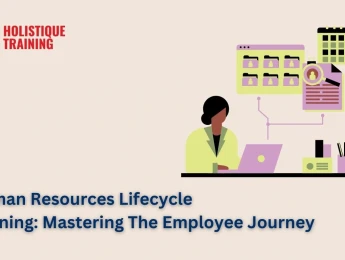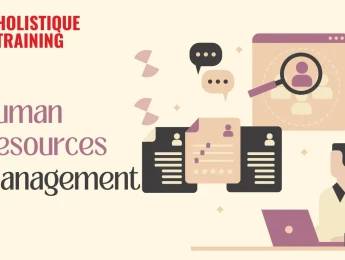Human Resources plays a key role in all aspects of an organisation, from hiring new employees to paying wages to supporting individuals with workplace issues and managing performance.
It is also an HR professional’s job to display and communicate all workplace values and ensure employees adhere to them at all times. To practice the values and fulfil the role in human resources, individuals must utilise effective management techniques to understand what people should be doing in their roles and how to get them there, legal practices and processes against company procedures to ensure managers are not performance managing staff unfairly and must also maintain both a privacy policy and open door invitation so anyone across the business, regardless of their role, is happy to air their concerns.
Balancing all of these skills and wearing multiple hats within the organisation can be challenging. It’s important to understand the procedures your organisation has in place and always follow these guidelines when advising or supporting others.
Upon completion of this course, participants will be able to:
- Understand the importance of human resource management (HRM).
- Develop strong human resources responsibilities within your organisation.
- Gain knowledge of legal policies and procedures.
- Be able to write effective procedures and values to place into your organisation for the benefit of everyone.
- Oversee the management of employees to ensure fair treatment.
- Develop a working knowledge of wages and the intricacies of these payments.
- Become an effective communicator, listener, and note-taker to document recurring problems.
- Handle harassment and bullying in the workplace.
- Investigate grievance issues and performance management problems to ensure fair treatment and effective resolution.
- Remain up to date with equality and inclusion policies to assist with recruitment.
This course is designed for anyone interested in HR or who currently manages HR policies and procedures and is eager to learn more about how their role could expand or benefit the organisation. It would be most beneficial for:
- HR Personnel
- Prospective HR employees
- Team Leaders
- Operations Managers
- Business Owners
- Supporting Staff
- Recruiters
- Health & Wellbeing Specialists
- Office Managers
- PAs
- Administrators
This course uses various adult learning techniques to aid full understanding and comprehension. Participants will participate in group activities to understand the benefits of policies and procedures and conduct learning exercises to create innovative communication methods to the rest of the business.
They will participate in various role-playing activities and view real-world cases of discrimination grievances and performance management meetings to understand the most beneficial response and handling methods and how the results affect the business.
Day 5 of each course is reserved for a Q&A session, which may occur off-site. For 10-day courses, this also applies to day 10
Section 1: An Introduction to HR
- The principles of human resources management.
- Familiarise yourself with procedures.
- The importance of company values.
- Recruitment and its effects on the rest of the business.
- Proper HR planning.
- Employment law and legislation considerations.
- Considering employment tribunals.
Section 2: Discrimination in the Workplace
- Fostering teamwork and healthy relationships.
- Wellbeing and its place in the workplace.
- Discrimination and identifying where people may have a case.
- Managing performance fairly.
- How to differentiate bullying from workplace disagreements.
- Managing sickness and absence.
- Mental health awareness and how to manage this.
Section 3: Handling Complaints & Grievances
- Conducting a fair investigation.
- Understanding both sides of an argument.
- Documentation and how to store records securely.
- Decision-making and coming to the best resolution.
- How to handle disputes and appeals.
- Following your procedures.
Section 4: Recruitment & Talent Management
- Identifying department requirements.
- How to secure the best candidates.
- Obtaining references and ID. What to ask for.
- Accurate and secure record keeping.
- Contracts of employment.
- Health and safety and family-friendly policies.
- Handling issues surrounding pregnancy and maternity.
Section 5: Succession Planning & Compensation
- Selecting candidates for progression.
- Appraisals and monthly performance meetings.
- PDPs and PIPs - when to manage performance.
- Positive performance management with scorecards.
- SMART targets in line with your organisation.
- Job analysis and benefits packages.
- Compensation and health care plans in line with salaries.
Section 6: Making Redundancies & Ending Contracts
- How trade unions can support employees and employers.
- Making redundancy decisions.
- Pensions and retirement costs and moves.
- Data protection considerations.
- Strategic HR development for the future.
Upon successful completion of this training course, delegates will be awarded a Holistique Training Certificate of Completion. For those who attend and complete the online training course, a Holistique Training e-Certificate will be provided.
Holistique Training Certificates are accredited by the British Assessment Council (BAC) and The CPD Certification Service (CPD), and are certified under ISO 9001, ISO 21001, and ISO 29993 standards.
CPD credits for this course are granted by our Certificates and will be reflected on the Holistique Training Certificate of Completion. In accordance with the standards of The CPD Certification Service, one CPD credit is awarded per hour of course attendance. A maximum of 50 CPD credits can be claimed for any single course we currently offer.
- Course Code PH1-115
- Course Format Classroom,
- Duration 5 days













